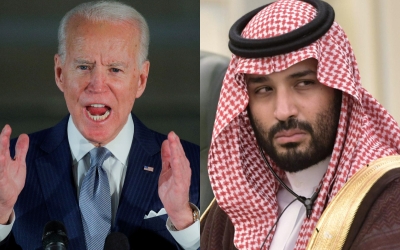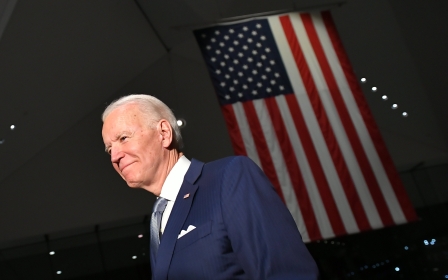US elections: Five foreign policy takeaways from draft Democratic platform

A draft of the 2020 Democratic Party platform promises to pursue a new path on foreign policy, rebuking President Donald Trump's "America first" unilateral approach, vowing to engage allies, stand up to authoritarianism and "act with clarity and purpose on behalf of human rights".
The platform is a non-binding document that spells out the party's priorities over the next four years.
The document, produced by a panel of delegates linked to the presidential campaigns of Joe Biden and Bernie Sanders, is not final, but it is an early sign that the party is moving towards more progressive policies on domestic and foreign affairs.
The draft was released to party members on Tuesday, and it will undergo further amendment by a larger committee next week before it is ratified at the Democratic National Convention in August.
Compared with the 2016 platform, the 2020 proposal adopts a more dovish tone on Iran, stresses human rights in the Gulf and voices scepticism towards military interventions in the Middle East.
New MEE newsletter: Jerusalem Dispatch
Sign up to get the latest insights and analysis on Israel-Palestine, alongside Turkey Unpacked and other MEE newsletters
"Turning the page on two decades of large-scale military deployments and open-ended wars in the Middle East does not mean the United States will abandon a region where we and our partners still have enduring interests," the document reads.
"Democrats believe it’s past time, however, to rebalance our tools, engagement, and relationships in the Middle East away from military intervention - leading with pragmatic diplomacy to lay the groundwork for a more peaceful, stable, and free region."
On Palestine, the draft disappointed many activists over its failure to mention the word "occupation" or outline consequences for Israeli abuses.
Here are five takeaways from the proposed platform's policies on the Middle East:
Diplomacy with Iran
The draft explicitly says that the Democrats are not seeking regime change in Iran. It stresses the need for a mutual return to the Iran deal, which saw Tehran scale back its nuclear programme in exchange for lifting sanctions against its economy.
Trump nixed the agreement, known as the Joint Comprehensive Plan of Action (JCPOA), in September 2018. Since then, his administration has been piling sanctions against Tehran as part of its so-called maximum pressure campaign.
In January, a US air strike killed top Iranian general Qassem Soleimani, bringing the two countries to the verge of war.
"Democrats will call off the Trump Administration’s race to war with Iran and prioritize nuclear diplomacy, de-escalation, and regional dialogue," the platform draft says. "Democrats believe the United States should not impose regime change on other countries and reject that as the goal of US policy toward Iran."
The document says returning to the JCPOA would open the door for "comprehensive diplomatic effort" to resolve other outstanding issues with Tehran, including the Islamic Republic's "regional aggression, ballistic missile program and domestic repression".
The passage on Iran stands in sharp contrast with the party's 2016 platform, which committed to the nuclear deal but also adopted tough language against Tehran. Four years ago, the party document said a Democratic administration would "not hesitate to take military action" against Iran if it raced towards developing a nuclear weapon.
No mention of Israeli occupation
While the Democratic Party is moving to the left, with several progressives making it to Congress since 2016, the Palestine-Israel plank of the platform has not changed much.
It still expresses support for Israel's security and denounces the Boycott, Divestment and Sanctions (BDS) movement.
One notable change is that the part about BDS came with a caveat about respecting free speech, a disclaimer that could be interpreted as a rebuke against anti-BDS laws that aim to restrict the right to boycott when it comes to Israel. Dozens of states have passed such legislation.
"We oppose any effort to unfairly single out and delegitimize Israel, including at the United Nations or through the Boycott, Divestment, and Sanctions Movement, while protecting the Constitutional right of our citizens to free speech," the document reads.
It also says that the party opposes "settlement expansion" as well as Israeli plans to annex parts of the West Bank, saying that it rejects "unilateral steps by either side".
"Democrats recognize the worth of every Israeli and every Palestinian," the draft reads, but it fails to mention, let alone denounce, the Israeli occupation.
"Democrats believe a strong, secure, and democratic Israel is vital to the interests of the United States," the document says. "Our commitment to Israel’s security, its qualitative military edge, its right to defend itself, and the 2016 Memorandum of Understanding is ironclad."
'Democrats will end support for the Saudi-led war in Yemen'
In straightforward terms, the draft pledges that Democrats will end the conflict in Yemen - one started in 2015 with help of Barack Obama's Democratic administration, in which Biden served as vice president.
"Democrats will end support for the Saudi-led war in Yemen and help bring the war to an end. This war is responsible for the world’s worst humanitarian crisis, and it amplifies threats to the region and to our interests," the document says.
"Democrats believe that the United States should support diplomatic efforts - not block them."
Last year, Congress passed a Democratic-led resolution to end US support for the Saudi-led coalition in Yemen, but it was eventually vetoed by Trump.
The draft platform also calls for resetting US relations with Arab Gulf states "to better advance our interests and values."
It said the party will back political and economic "modernisation" efforts in the region. "But we have no interest in continuing the blank check era of the Trump Administration, or indulging authoritarian impulses, internal rivalries, catastrophic proxy wars, or efforts to roll back political openings across the region."
Support for keeping small number of troops in Iraq
The proposal says the party supports keeping a "small, finite, and focused military presence" in Iraq to prevent the reemergence of the Islamic State (IS) group, also known as ISIS.
Early this year, the Iraqi parliament passed a resolution after the killing of Soleimani calling for American troops to leave the country.
The draft calls for "keeping up the offensive" against IS in Syria, without elaborating on whether the party backs American military presence on the ground in the war-torn country.
"We… will stand by Kurdish and other critical partners in that fight," it says. "We will work to repatriate foreign fighter detainees, and reinvigorate diplomacy to protect the humanitarian needs of all Syrians and find a political resolution for this horrific war."
Pledge to close down Guantanamo prison
On his way out of the White House, Obama said failure to close down the Guantanamo detention facility was the greatest regret of his eight-year presidency.
Biden has also vowed to shut down the legally dubious detention facility that houses prisoners from the so-called "war on terror".
In the 2020 draft platform, Democrats reiterate their pledge to close down the prison.
"We will close the detention center at Guantanamo Bay, enhance transparency, oversight, and accountability in counterterrorism programs and operations, and safeguard civil liberties and the rule of law," the document says.
The biggest hurdle for Obama's effort to shut down the prison was a 2009 law that prohibited using government funds to transfer detainees from the Cuba-based facility to the United States.
The draft platform says Democrats will push back against descrimination and white nationalism domestically.
"We will confront white nationalist terrorism and combat hate crimes perpetrated against religious minorities," it reads.
"Democrats will also work to restore trust with our Muslim communities by ensuring the government’s engagement is not discriminatory nor viewed through a security lens."
Middle East Eye delivers independent and unrivalled coverage and analysis of the Middle East, North Africa and beyond. To learn more about republishing this content and the associated fees, please fill out this form. More about MEE can be found here.








